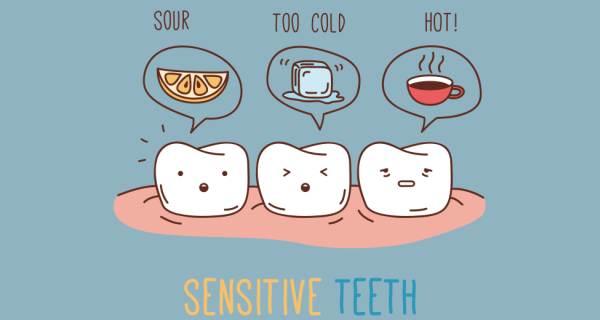What is Tooth Sensitivity or Sensitive Teeth ?
Patients suffering from teeth sensitivity usually avoid consuming hot or cold foods & beverages. They will be afraid to even brush thinking of the severe pain. Sensitivity occurs when the dentin, a porous tissue in the teeth gets exposed due to the depletion or thinning of the enamel.
This dentin consists of microscopic channels called tubules that are actually pathways to the nerve. The receding gum tissue and enamel loss can expose these tubules and can easily trigger the nerves by certain stimuli thus causing tooth sensitivity.
Signs & Symptoms of Sensitive Teeth
The main symptoms for teeth sensitivity is the pain, which is usually seen when the patient
- Consumes any hot, cold, sweet or very acidic foods and drinks,
- Breathing in cold air.
Tooth sensitivity can come and go over time.

Causes of Tooth Sensitivity
Factors contributing to tooth sensitivity include:
- Worn out tooth enamel from using a hard toothbrush and using a hard grip while brushing aggressively.
- Highly acidic foods and beverages can result in tooth erosion
- Tooth decay, worn out fillings and broken teeth may expose the dentin of the tooth.
- Gum recession that leaves the root surface exposed.
- Frequent dental cleanings and treatments
- Grinding teeth at night.
- Post dental treatment sensitivity is common and temporary, especially after procedures such as crowns, fillings and tooth bleaching.
How to Prevent Sensitive Teeth?
The best prevention measure for tooth sensitivity is to see a dental professional for a proper assessment and to find out the best steps to take for treatment.
Some of the other measures that can be followed to prevent tooth sensitivity are:
- Use a soft-bristled toothbrush.
- Brush with a sensitivity toothpaste, which will remove plaque to clean teeth while providing relief from sensitivity.
- Brush and floss your teeth twice a day to prevent tooth decay.
- Be sure to clean all parts of your mouth, including between teeth and along the gum line.
- Avoid acidic foods and drinks.
- Take immediate treatment for gum diseases
- Avoid frequent dental cleanings
Dental Treatment for Sensitive Teeth
The dentist will first examine the patient’s teeth and check for the cause of the teeth sensitivity and try to find the underlying cause. The dentist will then determine the treatment plan, usually it could be something simple like the fixing of a cavity or the replacing of a worn out filling.
However, if the discomfort is due to the gum loss exposing root surfaces, dentist may suggest a gum graft. A periodontist will be consulted to start the treatment by protecting the root surface and provide support to the teeth.
Use of De-Sensitizing Products
Even in cases where there is no obvious cause for the pain, there are many treatments to help manage the sensitivity. The dentist usually might apply an in-office gel that will strengthen the tooth enamel and reduce the painful sensations. Desensitizing toothpastes are also used to block off the endings of the nerves in the exposed dentin. Such toothpastes should be used on a regular basis. Dentist may also suggest rubbing the toothpaste directly on the affected areas after brushing the teeth.
Authored By Dr Sanjay N - Orthodontics & Dentofacial Orthopaedics, Bangalore









